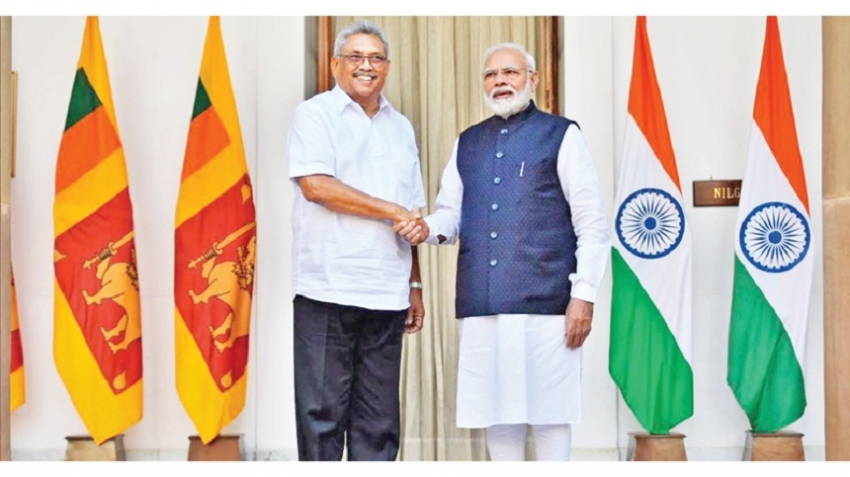The decision of President Gotabaya Rajapaksa to visit India on an official visit barely two weeks in to his tenure as President highlights the significance his administration has attached to relations with New Delhi and indications are that the response he received has been positive in his first exercise in foreign relations, a domain that has kept him quite busy in his first few days in office.
It will be recalled that the previous Rajapaksa administration, when present Prime Minister Mahinda Rajapaksa was President, had its ups and downs with neighbouring India but that was in the context of Sri Lanka then being at war with the Liberation Tigers of Tamil Eelam (LTTE).
At the time, India had to contend with terrorism south of its border in the Northern and Eastern provinces of Sri Lanka which the island was struggling to contain, an exercise in which it needed the active support of New Delhi. In turn New Delhi had to balance the threats posed by terrorism in Sri Lanka with appeasing some seventy million voters in the Southern Indian state of Tamil Nadu.
At the height of the Eelam war, the Congress party was in power and Manmohan Singh was Prime Minister. It is also relevant that in the very final stages of the Eelam war, India was in the midst of a general election. That election concluded on May 13, 2009. The final results were announced on May 16, 2009. A few days later, on May 19, 2009, the death of LTTE leader Velupillai Prabhakaran signalled the end of the Eelam war.
That election also returned Manmohan Singh and the Congress party to power, in what was to be his last term as Premier. The Congress party was assisted in its re-election bid by its ally in Tamil Nadu, the Dravida Munnetra Kazhagam (DMK) led by Muthuvel Karunanidhi, which won 27 of the state’s 39 seats.
Karunanidhi has, at various times been known to make statements aligned with the LTTE cause and with an election underway and his support required, New Delhi had to factor this in when dealing with Colombo regarding the Eelam war. Little wonder then that relations between the two countries were fraught at times.
Northern Provincial Council election
Even after the end of the war, New Delhi sought to exert its influence on Colombo and then President Mahinda Rajapaksa. For example, it was widely acknowledged that Indian insistence was instrumental in conducting the first ever elections to the Northern Provincial Council in 2013.
Comparatively, President Gotabaya Rajapaksa’s visit to India last week took place in a much more relaxed atmosphere. The political balance in New Delhi has also shifted significantly with the Bharatiya Janatha Party (BJP) now in power and Narendra Modi as Prime Minister. Modi was re-elected in May this year for a second five-year term.
Even so, there was speculation that the newly elected President would be asked about his commitment to catering to the interests of the minority communities in Sri Lanka, given the dichotomy of the election results that propelled him in to power.
The poll on November 16 showed a marked polarity in voting patterns, with the South of the country voting overwhelmingly for President Rajapaksa. In contrast, his principal opponent, the National Democratic Front’s Sajith Premadasa recorded high percentages of votes- over 80 per cent in most electoral divisions- in the North and East.
President Rajapaksa himself had alluded to this phenomenon in his acceptance speech, noting that he was the President of not only those who voted for him but also of those who did not vote for him. New Delhi would have been keen to determine what his aspirations for the latter were.
That the issue of devolution of power to the minorities was discussed was apparent, even in the statements issued after talks between President Rajapaksa and Prime Minister Modi, which are usually couched in diplomatic jargon and reveal little.
“I am confident that the Government of Sri Lanka will carry forward the process of reconciliation, to fulfil the aspirations of the Tamils for equality, justice, peace and respect. It also includes the implementation of the 13th amendment,” Prime Minister Modi said, while addressing the media jointly with President Rajapaksa after closed-door bilateral talks.
Financial assistance
In the process, India also announced substantial financial assistance to Sri Lanka: a US$ 400m line of credit for infrastructure and development and a further US$ 50m to combat terrorism. Premier Modi also expressed his satisfaction at the success of Indian funded housing assistance programmes, both in the North and East and in the estate sector.
-




















